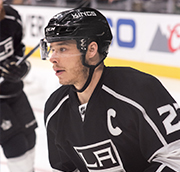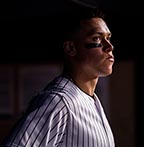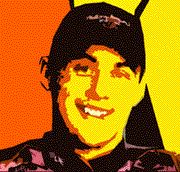Dustin Brown was called a “clenched fist on the ice.” And that’s by the people who liked him. The truth is that the longtime captain for the Los Angeles Kings had been called a lot of other things, too. Few players were as good as Brown when it came to burrowing under an opponent’s skin and taking them out of their game. In 2012, he took his agitating act to a new level when he led his team to one of the most improbable championship runs in NHL history. And just to prove it was no fluke, LA hoisted the Cup again two years later. This is his story…
GROWING UP
Dustin James Brown was born on November 4, 1984 in Ithaca, New York. (Click here for a complete listing of today’s sports birthdays.) Dustin was always trying to keep up with his brother Brandon. After seeing his older sibling on the ice, he learned to skate at age three by pushing a small folding chair in front of him. He played baseball, lacrosse and hockey as a boy and excelled at all three. Prior to his teen years, the smart money was on a future lacrosse scholarship, possibly to Cornell, his hometown school. His speed, relentlessness and physicality made him a star at that sport.
Dustin’s father was probably rooting for lacrosse. During the winter months, he chauffered his son to countless 5:00 a.m. hockey practices. Once Dustin reached the level where checking was tolerated, however, it became clear that he would be special hockey player. He knew how to use his body to create space, and he was able to use that space to put the puck in the net.
Dustin’s favorite player was Peter Forsberg, who became one of the NH’Ls most dangerous two-way players for the Quebec Nordiques and then the Colorado Avalanche. Dustin also recalls Joe Nieuwendyk bringing the Stanley Cup through Ithaca (where he had played in college) after the Calgary Flames won the championship in 1989.
Dustin enrolled at Ithaca High School in 1998. The school had a strong tradition in sports ranging from hockey to swimming to lacrosse. Two of its grads had even rowed in the Olympics. Dustin played his first season of varsity hockey as a freshman at the age of 14. He tallied 17 points in 18 games for the Little Red. The following season, Dustin netted 33 goals in 24 games and led his team to the 2000 state championship.
Dustin turned his attention to Junior Hockey in the fall of 2000 and played three seasons with the Guelph Storm of the Ontario Hockey League. Guelph is just north and west of Buffalo. In his first year with the Storm, Dustin registered 45 points in 53 games and made the OHL All-Rookie First Team. In his second season, he upped his point total to 73, on 41 goals and 32 assists. Dustin led his team to a berth in the Memorial Cup tournament, the championship of Junior Hockey.
Dustin saw his numbers almost reversed in his third and final season with the Storm, posting 34 goals and 42 assists for 76 points. That season, he played in the World Junior Championships for the second year in a row. By this time, Justin had become a complete player, at least by teenage standards. He skated well, hit very hard, had a good shot and could play either wing with equal skill.
In the spring of 2003, Dustin was eligible for the NHL draft. Projected as a first-rounder, he went to the Kings at #13. Los Angeles had a wealth of picks in the first round and also added Brian Boyle and Jeff Tambellini.
Dustin scored four exhibition goals and played well enough to break camp with the Kings at age 18. NHL rules dictated that if he played more than 10 games with the club he would have to remain on the roster all season long. The opportunity was there for Dustin to prove himself. Jason Allison and Adam Deadmarsh—two key forwards—began the season hurt. Coach Andy Murray liked what he saw from Dustin in the first couple of regular-season games and moved him to the team’s top scoring line.
Dustin skated well in 21 games before an ankle sprain derailed what could have been a stellar rookie season. He missed 26 games while on the mend. Upon his return he played with grit and passion, but Dustin finished the year with just one goal in 31 games. He went right from the Kings to Team USA that spring to compete at the World Championships in the Czech Republic. The Americans reached the semifinals but lost to Sweden and ultimately had to settle for a bronze medal. Dustin had one goal in nine games during the tournament.
Dustin’s sophomore year would have to wait, as labor strife led to a cancellation of the 2004–05 season. While many established players joined European clubs, Dustin simply went to the minors, spending the entire year with the Manchester Monarchs of the American Hockey League—the Kings top farm club. He scored 29 goals and dished out 45 assists while leading the team to a first-place finish in the Atlantic Division. The Monarchs fell to the Boston Bruins’ farm club in the first round of the playoffs in six games.
The league returned to the ice for the 2005–06 season, and Dustin saw lots of ice time during the year. He scored 14 goals and added 14 assists, and spent 80 minutes in the penalty box. Dustin showed flashes of his big-time skills throughout the season, and also at the 2006 World Championships. The U.S. finished a disappointing 7th, but Dustin netted five goals in seven games.
ON THE RISE
With more shifts and experience, Dustin began to gain a reputation for his powerful body checks. Three to five times a game, he would level an opponent with a crushing blow. His talent was understanding where the line was between a solid check and something that would draw the attention of referees. This drove opponents crazy—which was another important part of Dustin’s game. When teams focused on retaliating against him, his sharpshooting linemates found opportunities to score that might otherwise not have been there for them.
Dustin was also adept at tying up defenders on the power play in front of the net. When the puck was loose on a rebound, he used his strength and quickness to slam the puck home. In 2006–07—when he tallied 17 goals and 29 assists—he finished second on the Kings with 13 man-advantage goals.
Dustin cemented his spot as the tough guy on the team’s top scoring line in 2007–08, leading the NHL with 311 hits. But he also saw a lot more time on the power play and penalty kill. He showed an ability to beat defenders one-on-one. At 22, he was taking the final steps toward becoming a complete NHL player.
With unrestricted free agency looming at season’s end, the Kings made sure to wrap up Dustin during the year. They extended his contract six seasons at an additional $19 million. The move paid handsome dividends, as Dustin finished strong and ended up leading the club with 33 goals to go along with 27 assists. His 60 total points established a personal high.
Dustin was named the Los Angeles team captain at the start of the 2008–09 season. He was the youngest to wear the C in club history, as well as the first American to earn that honor. Meanwhile, Dustin continued to evolve in skill and confidence, particularly on offense. Unafraid to fire the puck, he put 285 shots on goal, good for eighth most in the NHL. The result was a team-high six game-winners and 17 multi-point games—of which the Kings only lost three. Dustin was an easy pick for the Bill Libby Award as the Kings’ MVP and earned his first All-Star appearance. He finished the year with 24 goals and tied his career high with 29 assists.
Dustin eclipsed that total by three the following year and also tallied his 100th goal and 200th point. The big news was that, for the first time in his NHL career, the Kings managed to reach the postseason. It was a short stay, however, as LA fell to the Vancouver Canucks in six games. Dustin scored a goal and had four assists in the series.
The Kings returned to the playoffs in 2010-11, but they again failed to make it out of the first round. This time LA fell to the San Jose Sharks. Dustin played the role of wrecking ball throughout the series, but he had a frustrating series offensively, accounting for just two points. For the season, he reached the 20-goal plateau for the fourth year in a row.
The 2011–12 season was viewed as a pivotal year for the franchise. It was time for Dustin and his teammates to take the next step in the postseason. But that seemed to be putting the cart in front of the horse, as the Kings struggled to be more than a .500 team for most of the campaign—prompting management to consider pulling the plug in the second half.
When other NHL clubs got a sniff of desperation, Dustin was the player they circled around. The Toronto Maple Leafs in particular were ready to pull the trigger on a deal. With trade rumors swirling, Dustin turned in one of his best games at the end of February against the Chicago Blackhawks. He netted three straight goals in a 15-minute span to notch a natural hat trick and added an assist for a career-high four points.
MAKING HIS MARK
The Kings finished with 40 victories and 95 points in 2011–12, enough to claim the eighth and final spot in Western Conference playoffs. Dustin had another solid season with 22 goals and 34 assists. He was the team’s third-best scorer after Anze Kopitar and Justin Williams. Goalie Jonanthan Quick had his best year with 35 wins and 10 shutouts. Though the Kings had squeaked into the playoffs, no one was writing them of. They played well in the final days of the season and had a deep, young lineup that was well-suited for postseason hockey.
What no one expected was how well coach Darryl Sutter’s team would play in enemy arenas. The Kings opened their postseason against a familiar foe, the top-seeded Canucks, the same team that had bounced them from the playoffs in 2010. Vancouver was without Daniel Sedin, who was recovering from a concussion. The Kings took advantage and won the first three games. Dustin netted a pair of short-handed goals in Game 2, tying a club record.
Dustin scored the deciding goal in the Game 3 win, banging in a rebound on a shot by Williams. Moments earlier, the Canucks had laid out Dustin with a hard check. He quickly recovered and set up in the crease for an uncontested rebound. Vancouver recovered to take Game 4, but the Kings won the series four nights later with a 2–1 overtime win—their third straight victory on the road.
Next up were the second-seeded St. Louis Blues. In Game 1, Dustin was the best skater on the ice. He sent a message to St. Louis when he delivered a bone-rattling check to Andy McDonald. The game turned on a steal by Brown when the Kings were shorthanded. He fired a shot on goal that was stopped, but Matt Greene swooped in and buried the rebound behind goalie Brian Elliott. The Kings went on to win 3–1. In Game 2, Dustin assisted on all three goals in a 3–0 victory, making five straight road wins for LA.
Dustin was starting to get some national recognition for his work as team captain. Many casual fans had never heard of him, but they could see how adept he was at getting under an opponent’s skin, especially on the penalty kill. Dustin now had four shorthanded points, and the playoffs were just seven games old.
The Kings finished off the Blues by sweeping the next two meetings in LA. In the finale, Dustin scored a pretty goal late in the first period to break a 1–1 tie. Quick did not allow another goal, and Dustin added an empty-netter for a 3–2 win.
The Western Conference Finals featured a showdown with the third-seeded Phoenix Coyotes. Dustin had a goal and an assist in the opener, helping his team to a 4–2 victory. In Game 2, the Coyotes targeted Dustin for some extra punishment. Martin Hanzal was whistled for boarding with a hit so vicious that he was suspended for Game 3. The Kings won their seventh road game in a row, and then returned to the Staples Center and took Game 3. The Coyotes forestalled the inevitable by winning Game 4. In Game 5, Dustin leveled Michal Rozsival with a crunching check an instant after the whistle had blown. the Coyotes were furious as Rozsival had to be helped off the ice. That lapse of focus paid off for the Kings on the very next shift, when Dustin Penner netted a goal. LA advanced to its first Stanley Cup Final since 1993.
The Kings played road warriors again in a 2–1 overtime win over the New Jersey Devils in Game 1. Kopitar scored the game-winner off a nifty no-look pass from Drew Doughty. Game 2 resulted in another 2–1 overtime win for LA. The Kings became the first team to go 10–0 on the road in an NHL postseason.
The Kings made Game 3 look easy, winning 4–0. In the battle of goalies, Quick took the lead in the series over veteran Martin Brodeur. Like Dustin, Quick was making quite a name for himself in the postseason. With all of LA expecting a coronation in Game 4, the Kings finally looked human and lost 3–1. Brodeur bounced back to play a brilliant game in goal, and Adam Henrique continued his surprising clutch scoring. The Devils continued to put on the pressure in Game 5, gutting out a 2-1 victory.
That win had many fans thinking that the Kings’ Cinderella run was over. But LA had a different idea. The Kings jumped on New Jersey for three goals in the first period. Dustin got things started with his eighth tally on the playoffs. LA scored again early in the second period to make it 4-0. The Devils were done. The Kings won 6-1 to capture their first Stanley Cup championship. Dustin was the first player to skate the trophy around the ice. His enthusiasm was contagious as usual.
At this point in his career, Dustin had elevated his specialty—taking a team out of its game—to something of an art form. His combination of overzealous checking, accurate shooting and passing, and quickness on rebounds made him one of the NHL’s most multitalented “pests.” What really drove opponents crazy was that Dustin rarely took the bait and retaliated when he got mugged. He was happy to watch the other guy skate to the box and get to work on the power play. No one in the game was better at staying just on the good side of the referees.
LA’s defense of their 2012 Stanley Cup was marred by a protracted lockout, which limited 2012–13 season to just 48 games. The Kings finished with 59 points, enough to make the playoffs but far off the pace set by Chicago, which finished with the best record in the NHL. For his part, Dustin netted 18 goals—second most on the team behind Jeff Carter—but was relatively quiet in the playoffs. The Kings knocked off the Blues in six games and then edged the Sharks in seven. Their season ended in the conference finals when the Blackhawks rolled over them in five games.
The 2013–14 season found the Kings making a serious run at the Stanley Cup again. They finished third in the tightly packed Pacific Division thanks to a stingy defense, the two-way play of Justin Williams, and the goaltending of Jonathan Quick, who allowed the fewest goals per game in the league. Dustin did not have a big statistical season, but his play was recognized with the Messier Leadership Award at the end of the year. The postseason began badly for the Kings, who fell behind 3 games to 0 to San Jose in the opening round. Only three teams in history had recovered from that deficit, but LA became the fourth. Next up were the Ducks, and again it took seven games for the Kings to advance. Incredibly, in the conference finals, LA went the distance again, avenging their loss to Chicago with an Game 7 overtime goal by defenseman Alec Martinez. The Kings had tied the score 4–4 Martin Gaborik tucked in Dustin rebound in the final minutes of the third period.
By comparison, the finals were a breeze. The Kings defeated the Rangers in five games, with Martinez netting the series-winner once again—this one in double-OT. Dustin’s goal in the second overtime of Game 2 was a huge momentum changer, and he finished the postseason with 24 points in 26 games. As in 2012, he was accorded the honor of being the first King to hoist the Stanley Cup.
Dustin’s play declined in the seasons that followed. He remained team captain through 2015–16 before passing the mantel of leadership to Kopitar. In 2017–18, at the age of 33, he had a glorious bounce-back year, blasting 28 goals to finish second on the club and leading LA with a +31 plus/minus. Near the end of the 2018–19 regular season, Dustin assumed the top spot of LA’s games played list with his 1,112th regular-season appearance. The mark he shattered belonged to Dave Taylor—the GM who had drafted him back in 2003.
After Covid delayed the start of the 2020–21 season to January 2021, Dustin netted his 300th career goal in the opened against the Minnesota Wild, becoming just the 23rd American player to reach that plateau. A few weeks later he became the 13th U.S.-born player to appear in 1,200 games. He would climb to 6th on the games-played list by the time it was all said and done. He finished his career in 2021 with 712 regular-season points.
FACTS
- Dustin has worn number 23 throughout his career. It was the last number left when he joined his high school team.
- Dustin was a defenseman when he first started playing organized hockey.
- Dustin won the Bobby Smith Scholastic Player of the Year Award in each of his three seasons with the Guelph Storm.
- The last 18-year-old to make the Kings before Dustin was Olli Jokinen. He played with the team a couple of weeks before returning to Finland for the 1997-98 season.
- Dustin’s first NHL point was a game-winning assist against the Florida Panthers. His first goal came against the Colorado Avalanche.
- Dustin was second in the NHL with 258 hits in 2006–07.
- Dustin notched his first NHL hat trick against the St. Louis Blues in 2008.
- Dustin played for Team USA at the World Hockey Championships in 2004, 2006, 2008 and 2009. He was also a member of the U.S. Olympic team in 2010, which won a silver medal.
- The 2012 Stanley Cup Finals marked the first time both teams were captained by American-born players, Dustin and Zach Parise.
- Dustin and his wife Nicole are enthusiastic supporters of the Child Abuse Prevention Center. The couple hosted the 2012 “Not So Serious” golf outing at Trump National Golf Club in Rancho Palos Verdes.
- Dustin and Nicole have three boys—Jake, Mason and Cooperi.
- Dustin plays racquetball in the summers to stay in shape.
- Dustin’s favorite musical groups are Kings of Leon and The Dave Matthews Band.
MY SAY
“You’ve got to try to go after guys, get guys off their game.”
“I have to bring my best to the table every day.”
“LA is one of those towns where if you want to get noticed, you have to win.”
“Our penalty killing is just X’s and O’s … and sacrifice.”
“When your name gets thrown out there—and I’ve been in LA my whole career—it was surprising. But in the back of your mind, as a competitor, you want to prove everyone wrong.”
“I think it’s important to be hard on the other team’s top player and I make an effort of finishing my checks. But those big, impact hits? They just happen.”
“Every time I get on the ice I look and see who the refs are. You have to scout them, just like you scout the other team. Some guys call the game pretty tight.”
“Being captain is a lot more work than I thought it would be, that’s for sure. But I see it as a welcomed challenge and one that I take very seriously and work hard at. It’s a lot of fun and with this team it’s pretty easy to keep the guys motivated because we all push each other.”
“The first thought I had coming in on the plane was that there were palm trees and I couldn’t believe they played hockey here.”
“The Stanley Cup is a special trophy, and you kind of dream about having this chance your whole life if you’re a hockey player.”
“We have everyone being physical, bumping. When you have 20 guys doing that to you for 60 minutes, it can be a frustrating game.”
“Short-handed goals build a lot of momentum and take away a lot of momentum.”
“I felt like we had a team that could do a lot if we got there and started playing together. We felt like we owed it to the fans here to take a shot.”
“I just have to keep my feet moving to stay out of penalty situations.”
“If I’m going to take a penalty, I want it to be because I ran a guy through the boards.”
“We’re starting to see people get pretty excited about the Kings right now, and that’s nice from a player’s standpoint, but probably more important for those die-hard fans that have been here through the 45 years.”
THEY SAY
It’s almost comical to watch, because you think he runs on batteries sometimes. He just keeps on going. You can knock him down but you can’t keep him down. He takes a lot of punishment because he gives it out.
He knows how to lead, and he does it by example.
Over the past few years he’s really taken a more active role in his responsibility of trying to set the tone and trying to set the pace for our team. I think he’s done an excellent job.
We like how he competes, we like his toughness.
He’s doing what leaders do—recognizing critical moments and getting it done.
He has that look like he is willing to go a little further than you are.






Comments